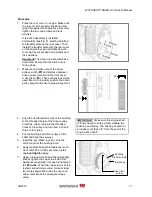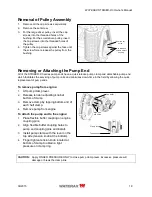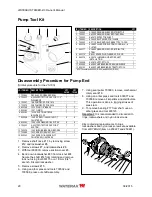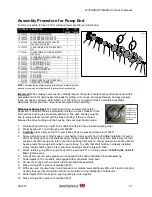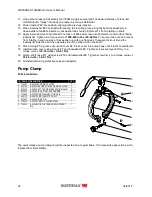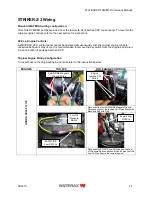
WATERAX
STRIKER-2/3 Owner's Manual
8
09/2015
Operating STRIKER-2/3 Series Pumps
Pre-Operation Checklist
Before using your pump, follow this verification procedure:
1. Visually inspect product
When you first receive your STRIKER-2/3 pump, inspect the product and check for any
damage. Notify the supplier if any damage is found.
2. Check all fluid levels regarding the pump and any related equipment. Before first use,
you must prepare the engine which is shipped dry. Before each subsequent use, check
levels and top up as needed.
Engine/apparatus fuel level
Engine/apparatus oil level
All batteries electrolyte level (not required for sealed batteries)
Refer to the engine manufacturer’s manual for specific instructions
regarding the engine
.
3. Check that all suction and discharge hoses are structurally sound and do not leak.
4. Visually inspect any electrical or electronic components for damage.
5. Inspect all safety features and verify that they are in good order before using the pump.
6. Visually inspect the pump’s drive belt and ensure it is in good condition without cracks
or excessive wear.
7. Each time you plan to use the pump, check for damage that may have occurred during
previous use. Notify your manager that the equipment requires repair. Remember that
damaged equipment can expose you to safety hazards.
Flooded Suction
Use this procedure if you are taking water from a hydrant, another pump, or a closed tank.
Be sure to understand and follow all related equipment, apparatus, departmental, and
governmental procedures, policies, recommendations, and guidelines concerning hydrant
connecting and operation before performing this mode of operation.
1. Connect the intake hose to the pump intake or intake piping.
2. Connect opposing end of the hose to the hydrant or water source (a tank may already
be connected). Make sure that all connections are strong and tight and that all pump
valves are closed.
3. Check that all equipment is rated to the proper pressure limits that they will be exposed
to during this mode of operation. DO NOT exceed the maximum intake pressure of the
pump (150 PSI).
4. Slowly open the pump inlet valves allowing the water into the pump body.
5. Slowly open the discharge valves to allow for entrapped air in the piping to escape.
6. Once all the air has escaped, close any opened valves so that the unit may be started.
7. Go to the
Startup and Discharge
section of this manual to begin pumping water.
The pump will not discharge more water than the capacity of the water source
(hydrant). The pressure reading on the pump’s master intake gauge should never
fall below 0 PSI during the pump operation in this mode.



















